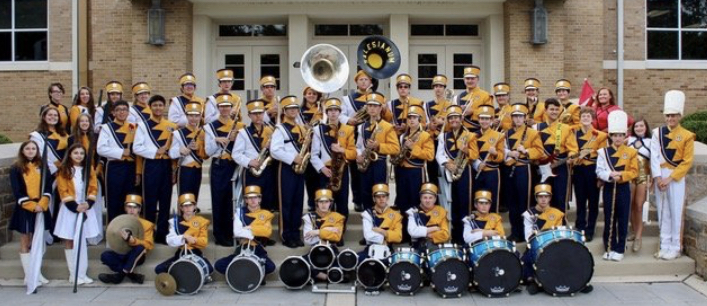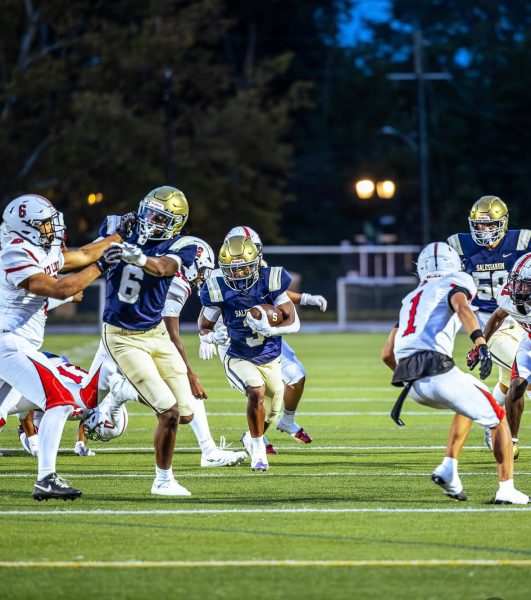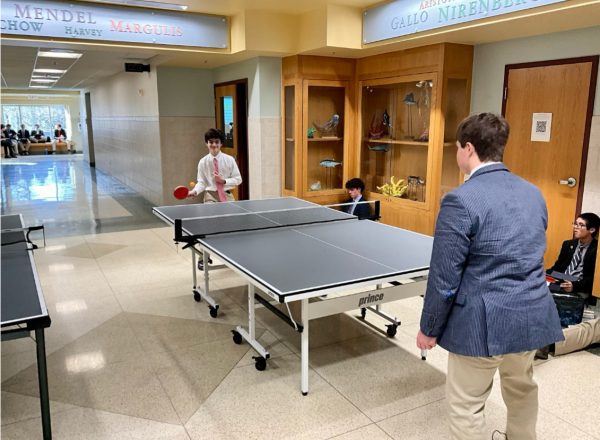The Song Remains the Same: Salesianum Marching Band Is Getting the Led Out
Official 2019 Band Photoshoot by Pam Nagle
Don’t let their dapper uniforms fool you; behind their time-honored attire lie the music makers who are ready to rock ‘n roll!
As a school community, the Salesianum, Ursuline, and Padua family enjoys the adrenaline rush of watching its Salesian brothers dominate the football field. But is enough credit given to the people who amp up the event? Although on the sidelines, the marching band is constantly creating the mood at all times. They energize the crowd and keep it going, regardless of how the team does on the field. They always have a show destined to entertain.
This year, the marching band has really put on a show for the entire school. To put things into perspective, the marching band chose the momentous task of playing Led Zeppelin this season, one of the greatest bands in rock history. Having talked to the band director, Mr. Brian Cox, as well as the band’s guitarist, junior Matthew Hasenhauer, it is clear that they acknowledged the challenge, but are willing to accept it.
The season was meant to commemorate the 50th anniversary of their debut album, Led Zeppelin I, released in 1969. “We wanted to kind of put that in perspective,” said Mr. Cox. Indeed, time flies by fast, especially when such a masterpiece never ages. As he put it, “Music like Led Zeppelin is timeless.”
Time aside, the set list consists of five undeniable classics: “Rock and Roll,” “Black Dog,” “Whole Lotta Love,” “Immigrant Song,” and “Moby Dick.” These are all popular songs that fall within the early era of Led Zeppelin’s career. This is no coincidence, since the band seeks to highlight the blues-based “early album” songs. Even without “Stairway to Heaven” or “Kashmir,” the Salesianum marching band has proven itself able to put on a show that sounds like Led Zeppelin itself. This is especially true since Hasenhauer plays authentic Zeppelin guitar solos, with the percussion section sounding just as thunderous as Zeppelin drummer John Bonham.
What exactly goes into such a grandiose display? Almost immediately, Hasenhauer returned with a retort. For starters, they meet Tuesday, Thursday, and Friday from 3:30 to 5:30 during school weeks. According to Hasenhauer, each day has a different exercise in store for its members. “Thursday’s meant for practicing music we play in the stands, and Friday’s meant for field show music, which is when we go to the field.” On top of that, they train in the summer for ten days. There, the students go through ‘basic training’ that is “very similar to sports teams.” That’s not to mention the fact that they have to lug all of their equipment onto to the field and be ready to go. For their part, the parents are just as immersed in the routine as the students themselves. “The parents of a lot of the students help us pack all of our stuff and get it to the field.” They also feed the students and handle transportation duties. Clearly, it’s more exhausting than the outside eye may perceive.
All the commitment is evidently worth it. Each of the band members derives a sense of enjoyment and purpose from their hard work. “We’re having so much fun at the games that I only realize how tired I am when I get in the car to go home,” said Hasenhauer. None of the members “get tired of going to practices, games, or competitions.” It’s more than playing the same music repeatedly; it’s about “doing it with friends.”
The sense of community isn’t the only benefit to the training. Through their practices, they become more proficient at playing the music and marching at the same time. As a result, they’re better showmen. “We wind up doing things that very few other marching bands do,” Mr. Cox explained. No other marching bands that anyone can think of have put as much time into showcasing Led Zeppelin. No other bands have left a lasting impression like Salesianum. They’re all about crowd pleasing. “You know, if they like something, we’ll play it up. If they don’t like something, or if they’re just kind of lukewarm, we might totally change a section or drop a section. It’s because we don’t care about competitions; we’re all about entertaining the audience.” As long as the band can do that, which they clearly can, there’s almost nothing left to be desired.
Despite such an immersive season, the only regret is Mr. Cox’s previous distaste for Led Zeppelin. “I was really turned off by them… because I always associated them with, like, the drug culture, and you know, stuff like that,” he said. This changed when his friend played him one of their songs in college. Needless to say, he was impressed. Having discovered that he “unfairly” judged them, he then replied, “The music is what’s important.” Not only has he come to enjoy their music, he has taken up the mission of paying homage to them. “The fact that 50 years later, everybody still knows those songs, everybody still likes those songs and appreciates them, is just a tribute to the lasting quality of the music,” he concluded.











